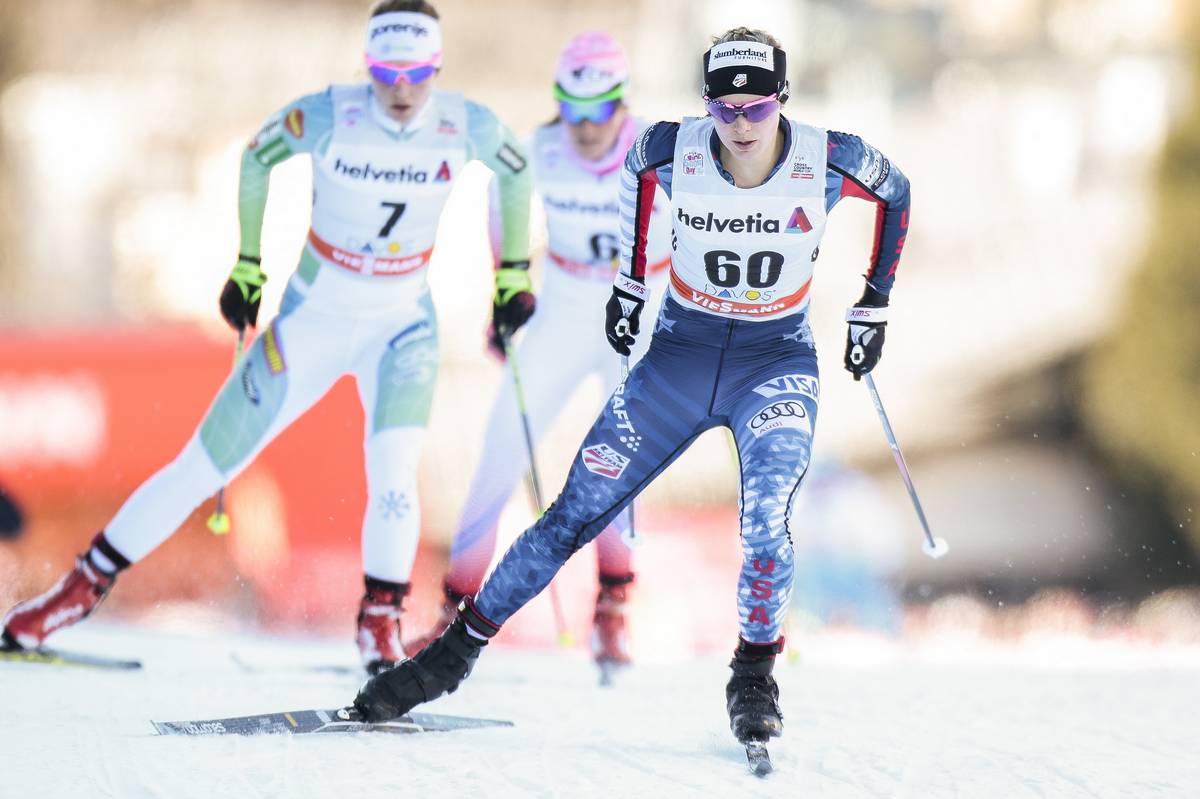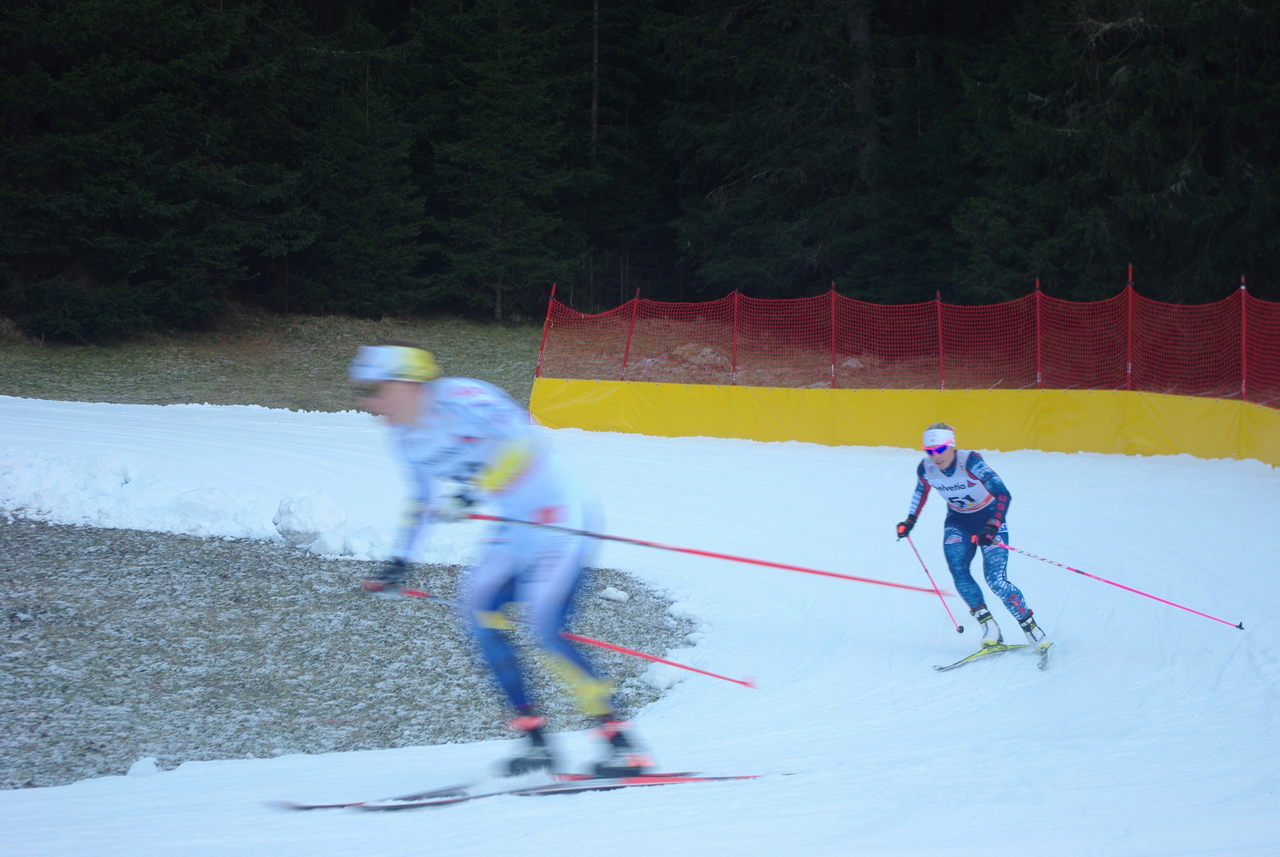
DAVOS, Switzerland — Coming off a win in the 5 k skate in Lillehammer, Norway, this weekend, the U.S. Ski Team’s Jessie Diggins knew that plenty was possible in Saturday’s World Cup 15 k skate.
“I was not expecting to come into the season this hot; normally I would work my way right into it,” she said, “It definitely makes it really fun and exciting when you have you’re sights set on the podium, and you can realistically expect to be in the fight.”
Fight she did, rising from sixth at the race’s halfway point to fourth at the finish, her best result ever in Davos and also the best 15 k of her World Cup career.
Her time was 54.3 seconds behind that of Ingvild Flugstad Østberg of Norway, who won the day.
“Working on the long distances, it’s still a ways to catch up to the girls at the top,” Diggins said. “But it’s a long season, and we have a lot of belief, a lot of sparkles on our side.”
By 10 k into the race, she was up into fifth place, and within a second of the time laid down by Nathalie Von Siebenthal of Switzerland. Because Diggins had started last out of the field’s 60 competitors, she knew exactly what she had to do to close time on her competitors over the last five kilometers.
“I know I was really close, like four or five seconds between several of us. “So I was happy to have been able to finish strong, and proud of how I skied the downhills!”
The 15 k in Davos is not a kind one, with a long flat section out of the stadium and then an undulating climb which provides little to no rest until more than half of the race loop’s 5 k distance is completed. After topping out, it’s a fast downhill section to the lap, and then it’s on to the climb again.
With the race venue sitting at over 5,000 feet of elevation, pacing becomes even more challenging.
“It’s definitely hard to pace here, because it’s a 15 k at just the right amount of altitude where if you go under, you’re done,” Diggins said. “But you don’t want to finish with gas in the tank. This was the closest I’ve ever come to the right pacing, and I still think it could have been maybe a little bit better.”
The downhills also don’t provide much rest, with several icy hairpin turns before the course re-enters the stadium.

“I wasn’t happy about starting last here, not going to lie,” Diggins laughed. “I didn’t enjoy that, but the downhill, the big corner there, I would just look for the fresh snow, and throw a hard skid, and step, and it was fine, so… The course held up remarkably well. You know, it’s almost worse on training days when there’s a million techs, and on racing day, there’s actually much less traffic.”
Diggins is now ramping up for the skate sprint to be held tomorrow. Last year she finished ninth in the event.
“This is a really interesting course; it’s very tactical, I think it’s hard to drop people, and it’s hard to be dropped,” she explained. “I don’t know–I tend to favor distance races sometimes, because it’s more about your fitness and you, than tactics and seeing if people are pushing, or you get lucky, or you find a window or not, but I’m excited to see what I can do going into it with positive attitude and looking for every opportunity.”
The U.S. women haven’t had much luck in sprint heats this season, with four women – Diggins, Sadie Bjornsen, Sophie Caldwell, and Ida Sargent – making the quarterfinals in the classic sprints in both Lillehammer and Ruka, but none advancing to the semifinals.
“This has been a historically great place for us, so knock on wood, but it might be time to turn it around,” Diggins said.
With the season start she’s had, more excitement always seems to be just around the corner.
“Training load is still fairly high, so the goal is always way later in the season for me, but to be in the fight this early is like ‘that’s exciting, that’s great!’” Diggins said. “If you would have told me that this summer, I would have been like, ‘nah’.”
For the U.S., Liz Stephen was the next finisher after Diggins, earning 28th place (+2:17.5).
“This year, I think that especially with the 15 k, just having to focus for such a longer period of time on that weird grade, I actually was not that excited going into the race this morning,” admitted Stephen, who has finished in the 20’s each time a 15 k race has been held here in Davos.
“I recognize it, because it’s not usually how I feel,” she continued. “I had to sort of restructure my brain this morning. And just really focus in on what my goal of the day was, which was just to ski as smooth and big as I could, and keep it into my race. Then my brain kind of opened up as I got out there. But it’s a really challenging race and every year, it’s just a really hard grade and altitude to feel like you’re racing. And I think when you don’t feel like you’re racing in your brain, it’s hard to keep engaged.”
Kikkan Randall finished 33rd (+2:30.2) and Caitlin Patterson 44th (+3:21.6). Rosie Brennan did not start.
“It was just so much altitude, flatness, yuck,” Patterson said.
Emily Nishikawa led the Canadian team in 34th (+2:33.5).
“The two girls that started right behind me [ninth-place Ilaria Debertolis of Italy and 13th-place Polina Kalsina of Russia] caught me, and they are both holding on to pretty good times, so that was nice to ski with them,” Nishikawa said. “It’s a super-hard course. So it’s great to have people out there to help you.”
— Jake Ellis contributed reporting
Chelsea Little
Chelsea Little is FasterSkier's Editor-At-Large. A former racer at Ford Sayre, Dartmouth College and the Craftsbury Green Racing Project, she is a PhD candidate in aquatic ecology in the @Altermatt_lab at Eawag, the Swiss Federal Institute of Aquatic Science and Technology in Zurich, Switzerland. You can follow her on twitter @ChelskiLittle.



